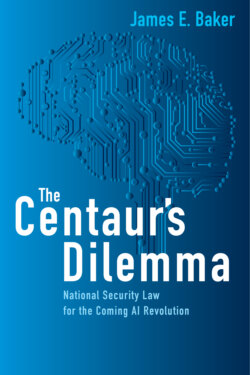Читать книгу The Centaur's Dilemma - James E. Baker - Страница 6
На сайте Литреса книга снята с продажи.
ОглавлениеACKNOWLEDGMENTS
The COVID-19 pandemic, like AI, reminds us of the connections between countries, states, and humanity. It reminds us as well of the importance of our connections to family and friends. The pandemic has brought many a sense of disconnection and isolation. But in silence and distance there also comes joy and strength. Joy comes from observing daily the courage, commitment, and kindness of our first responders and healthcare professionals. Strength comes from knowing anew that friendship, like love, reaches across time and distance. It remains with us when we are alone as it is manifest when we are together. That is why this book is dedicated to my friends. An earlier book was dedicated “To My Teachers,” including my mother—a lifelong teacher in the classroom and at home. Not to be outdone, my fathers, Jim Baker and John Flender, have supported me with love, friendship, and advice, always with humored patience. That is why this book is also dedicated to my fathers.
Family and friends sustain us in times like these. They offer perspective. They offer connection. They are role models, teachers, coaches, and companions from near and afar. At this time, in this moment, as at all times, I am thinking of them and thankful for who they are.
Although I did not know it at the time, this book started with a 2017 speech on emerging technology by Jason Matheny, director of the Intelligence Advanced Research Projects Activity, to the American Bar Association Standing Committee on Law and National Security. Because we were standing in a room full of national security lawyers, I asked Jason how lawyers could help prepare the government and the country for the coming AI revolution. Jason responded, “By answering the question: How do, and how should, law and ethics apply to artificial intelligence?” Two weeks later Jason called to say he had found someone to answer his question and could we meet for coffee. It was a ruse. But I was soon persuaded, as Jason is, that AI will transform national security practice. And I signed on, because national security practitioners have a duty to prepare to meet tomorrow’s challenges, not just today’s. This book is my answer to Jason’s question.
My acknowledgments, therefore, start with Jason Matheny, now director of the Georgetown Center for Security and Emerging Technology (CSET). Jason is a great public servant and friend. He has supported my research in and out of government. So has the CSET team, including Tarun Chhabra, who was especially helpful in pushing this book through to the publication finish line. Extra thanks and appreciation also go to Lt. Gen. Jack Shanahan for his comments and insights along with his commitment to the role of law and ethics in shaping the AI enterprise.
Special thanks goes to Laurie Hobart and Matt Mittelsteadt, who are part of the Syracuse University Institute for Security Policy and Law (SPL) CSET team, for their insights, explanations, probing questions, editing, and humor. Mention in dispatches also goes to all of the SPL team, including but not limited to Kristen Duda, Lee McKnight, Jonathan Medina, Lauren Pentrak, Lauren Sutkus, Tom Clifford, Rickson Galvez, Jake Larkowich, Tom Odell, Keli Perrin, and Bob Murrett.
As is their practice, Bob Kimball, Don Mitchell, and Dan Koffsky encouraged and helped me find my legal voice. And, as is his practice, Bob Kimball also served as my historical and legal teacher/editor, a role he first played as a teaching assistant in 1981, when I was a college student. Jamie and Grant deserve thanks as well for endless nights, and as it turns out days too, talking about the Defense Production Act, rather than more obscure topics like film, history, literature, and basketball.
Appreciation is also due to Richard Samuels, John Tirman, and all of the team at the MIT Center for International Studies (CIS), including Michelle English and Laura Kerwin, who gave me the time and space to study AI while serving as the 2018–2019 Robert E. Wilhelm Fellow. Special thanks as well to Joel Brenner for getting me to CIS, and to Colonel Shannon Brown, Colonel Douglas Copeland, Colonel Randel Gordon, Captain Pete Mirisola, and Colonel Warren Sponsler for sharing the educational journey and more so for your honorable service upholding and defending the Constitution.
Finally, I would like to thank Bill Finan and the Brookings Institution Press team, including Kristen Harrison and Cecilia González. Bill immediately saw the potential and need for a book on AI and national security law and dared to stick with it, even though Brookings Press is known for its policy insight, not its legal treatises. But like Jason Matheny, Bill saw the need and was gracious enough to let me help fill it, but only after I deleted 20,000 words and 20,000 footnotes. Olga Gardner Galvin is a careful, patient, and thoughtful editor. Thank you, Olga, for saving me more than once from later embarrassment.
If there is something useful and good in the book, please thank the people mentioned in these acknowledgments. However, all the views expressed are my own, as are any errors.
